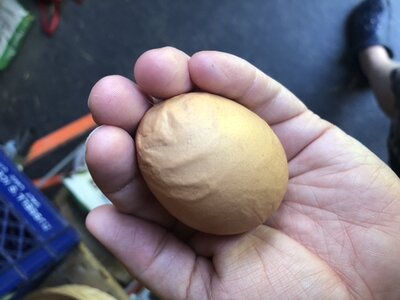little20project
In the Brooder
- Jun 3, 2020
- 2
- 2
- 11
I have been getting some corrugated eggs recently and I think the cause is how we are soaking the feed. Would love some fine tuning suggestions on our routine.
Here are some flock & region stats:
-9 Hens: 5 over 4yrs old & 4 2yr old rescue battery hens (with clipped beaks)
-Integrated for over a month now
-We are in Utah. So the summer heat is in the mid 90’s to 100 during the day
-Large run area using 150’ of premier1 electric netting
-Large 7gallon pan with daily fresh water
-5 gallon gravity water jug with tray
-Lots of shade with grass areas & gravel areas to scratch
-free feed to oyster shells & grit
Now onto the feeding stats:
I mix into a bucket 4 cups of IFA 20% mash with 4 cups of a feed called Hippie hen.
Hippie hen has non-gmo whole grains/seeds mix & 16% crumble.
I fill the bucket up with water so it soupy but not too watery.
I come back later and it’s all absorbed into the feed. I call it goopidy glop oatmeal.
This 8 cup mix lasts 2-2.5 days.
As I get to the bottom of the bucket it does start to smell sour which I’ve read FERMENTED feed should start to smell.
My main question is: am I hovering between soaked feed and fermented feed?
For the health of my hens do i need to soak a smaller (1 day) amount or go for the full 3 day ferment?
I really feel the couragated eggs shells is from the nutrient absorption.
Thanks in advance!
Here are some flock & region stats:
-9 Hens: 5 over 4yrs old & 4 2yr old rescue battery hens (with clipped beaks)
-Integrated for over a month now
-We are in Utah. So the summer heat is in the mid 90’s to 100 during the day
-Large run area using 150’ of premier1 electric netting
-Large 7gallon pan with daily fresh water
-5 gallon gravity water jug with tray
-Lots of shade with grass areas & gravel areas to scratch
-free feed to oyster shells & grit
Now onto the feeding stats:
I mix into a bucket 4 cups of IFA 20% mash with 4 cups of a feed called Hippie hen.
Hippie hen has non-gmo whole grains/seeds mix & 16% crumble.
I fill the bucket up with water so it soupy but not too watery.
I come back later and it’s all absorbed into the feed. I call it goopidy glop oatmeal.
This 8 cup mix lasts 2-2.5 days.
As I get to the bottom of the bucket it does start to smell sour which I’ve read FERMENTED feed should start to smell.
My main question is: am I hovering between soaked feed and fermented feed?
For the health of my hens do i need to soak a smaller (1 day) amount or go for the full 3 day ferment?
I really feel the couragated eggs shells is from the nutrient absorption.
Thanks in advance!





